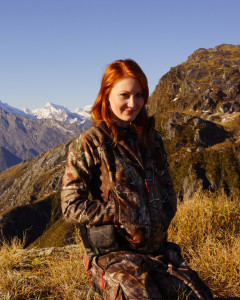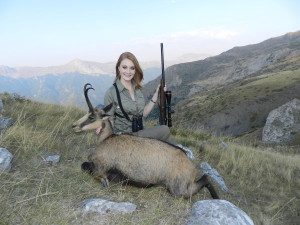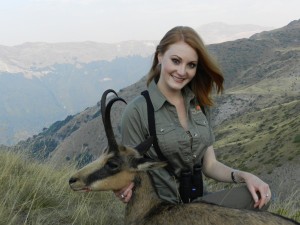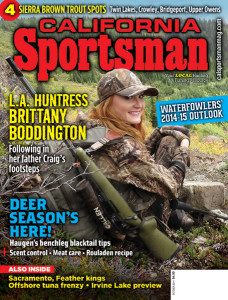Hunting With Brittany B.
Editor’s note: The following story is available in the October edition of California Sportsman. The subject of this interview, Brittany Boddington, is also debuting as a columnist in the November issue.
By Chris Cocoles
There was little evidence pointing to
young Brittany Boddington being
the apple that didn’t fall very far
from the tree. In fact, she seemed orchards
away from her father, Craig Boddington,
a well-respected hunter, author and outdoor
journalist.
As the Boddington family settled in
Los Angeles’ San Fernando Valley, Brittany
had very little interest in following
in Craig’s footsteps. A competitive synchronized
swimmer good enough to
make the U.S. Junior National Team, her sport
of choice didn’t exactly have much in
common with shooting.
“I was swimming around 35 hours a
week, so I didn’t have a lot of time to worry
about guns and hunting,” she says. “There
certainly wasn’t any hunting going on at
that point.”
But times change, and the Boddingtons
have now become a family of big-game
hunters (Brittany’s younger sister,
Caroline, has also since joined in).
Brittany, now 28, still lives in L.A. and is
an aspiring journalist – after taking some
time off from school to travel the world
and hunt throughout it, she’ll earn a journalism
and mass communications degree
next year. She also has appeared on several
television shows (some with her dad,
and they’ll collaborate on a show later this
year), hunting in such far-flung locales as
New Zealand, Peru, Turkey and Macedonia.
“I’ve always had a passion for travel.
When I was 10, my dad would go to Africa
for the summer and (the rest of the family)
would go to Mexico,” says Boddington,
who spends as much time on the African
continent as her time and finances allow.
She’s hoping to find a niche not just as
a hunting TV show host but also as a writer
(Craig has written numerous hunting
books and is published around the world).
We chatted with Brittany about life in L.A.
as a big-game hunter, and how hunting
went from nonexistent to a lifelong passion.
Chris Cocoles It’s a surprise to me that
you were kind of late to the party when
it comes to hunting, especially given
your dad’s background as a renowned
sportsman. So how it did happen?
Brittany Boddington I was pretty much
against hunting through most of my
childhood into high school. And I think a
lot of that stems from just growing up in
Los Angeles. I had to explain to my friends
why my dad was killing Bambi [laughs].
So it took me a while to come around. I
didn’t even want to shoot a gun and really
didn’t until after high school.
My (high school) graduation present
was a trip to Africa with no intention
of hunting. He just wanted to show
me where he’d been. And I was really
excited to see it. But before the trip, I
decided to do some research and more
and more sites were popping up with
safaris as an option. So finally, just out
of curiosity, I started clicking on them.
In my research, I found out more and
more why people did hunt in Africa.
I had no idea what he was doing. So
once I learned that were regulations
and conservation aspects, especially in
Africa, where there was very little else
to do besides hunting to control these
populations, I came around to the idea
pretty quick, and startled my dad by
asking to teach me how to shoot. And
he just said, “Why?” [laughs]. I said,
“We’re going to Africa. Don’t you think
I should learn how to shoot?” He again
said, “Why?” I told him I wanted to hunt.
CC So was that, at the time, a major shock
to him, because you had not shown a lot of
interest in the past?
BB It was, because he didn’t believe me. So
he told me if I could go on a pig hunt in
California, then he would arrange for permits
to hunt in Africa. He thought I’d go to
Africa and chicken out. So he set up the pig
hunt in California. And he figured, if I kill
one of those, then maybe I would actually
do something in Africa when we got there.
So I shot a boar in Northern California. I remember
when the gun went off, he looked
at me instead of the pig and asked, “Are
you OK?” [laughs]. I never lost eye contact
with the pig and said, “Let’s go, let’s go.”
CC Was that first shot and taking down that
pig difficult at all?
BB No. For some reason there was never a
second thought; it was instinctual, I think. I
was super excited. They thought I’d missed
him; it was a huge group of pigs coming
over the edge of this ridge. And the guide
told me to shoot the one with the big black
spot, and I shot the one with the big black
spot. And I saw him roll down the ravine,
but they were watching the pig with the
black spot in the front, but I shot the one in
the back. I said, “He’s down; I can see him!”
It was really exciting.
CC Your dad must have had a lot of
thoughts racing through his head at that
point.
BB I think it was very exciting for him. The
idea to have someone pass it onto, I think
it had been lacking for him. I think he was
really excited. My sister wasn’t that excited
about it either, although she grew up
shooting a lot more than I did. She had one
of those cricket guns when she was like 6
and would go to the range. She loved it,
but as she got older, things got more interesting,
like hanging with her friends. She
just stopped going to the range, and when
she did go she would usually play with her
phone. But then at 16, she also wanted
to go on a pig hunt, and she did. So I just
think there were late bloomers in our family.
But it’s also hard because we grew up
in California, and it’s not the nicest place to
explain to your friends, as a kid, what your
dad does. I told them my dad was a sportswriter,
and I think they all thought he
wrote about basketball. I never explained
it. When I was a child we didn’t have a lot in
common; he was never into synchronized
swimming and I was never into hunting.
So there wasn’t a lot to talk about. But after
that first safari, our relationship had grown
dramatically. We had a common ground.
CC Did he try to get you involved, or did he
back off and let you do your own thing?
BB I have a vague memory of when I was
6 or 7 and he let me shoot a gun when we
were on a trip. It was way too big of a gun
for me. I got knocked down and cried, and
that was the end of it for me. He would try
to talk to me about hunting, but I didn’t
want to hear it. I was uninterested.
CC Tell me about that first Africa trip.
BB I’ve always had a passion for travel. Africa
was always huge on my hit list. I’d been
hearing about it my whole life, and our
house was decorated (with an African motif).
But I had a very different idea on what
it would be, I guess. That’s not to say it was
better or worse. But it was absolutely completely
different, in a wonderful way. And
that first trip will always be the pinnacle
of the travels in my career. It was a huge
eye-opener and a life-changer for me.
CC What did you hunt on that first trip?
BB The first animal I shot was a springbok,
and then another springbok. And a zebra,
kudu and gemsbok.
CC As a former competitive athlete, did
that fuel your hunting competitiveness?
BB Definitely. That first trip, my best friend
from childhood was also with me. And we
had a major competition going. But I think
the spirit of competition is something that
carries over into a lot of different aspects of
my life. I wouldn’t say that I’m competitive
with any one person. It’s more in me to be
the best that I can and see the most that I
can in the world.
CC I’ve just started to travel abroad in maybe
the last five years, but you had a chance
to see the world at a young age. What was
that like on a personal and cultural level?
BB My dad and I worked out a deal: as long
as I stayed in school he’d help me out financially.
But when I left school, that was kind
of lost, and rightfully so. So my travel was
pretty much this: I’d be home and would
work four jobs until I was ready to leave,
then spend everything I had, come back
broke and work again until I could afford
to go back out. It was an interesting lifestyle,
but I wouldn’t trade it for the world.
And I think it’s also very character-building
to do it yourself. I really enjoyed that period
of my life. If anything, I would have done it
a little bit longer [laughs].
CC What was it like to be able to embrace
the culture of where you visited?
BB It was awesome, especially since I did a
lot of traveling alone. I think a lot of people
travel in groups, and it almost becomes a
crutch to buy into whatever culture you’re
in. Traveling alone is very interesting because
you don’t have a lot of choice but to
fully immerse. I totally did a lot more things
than I would have; I would have a lot times
hesitated if I had anyone to hesitate with
me, if it was eating a certain food or doing
something fun. You push yourself and it’s a
very good growing experience.
CC You have seen some fascinating places.
BB I’ve been hunting in Europe, the South
Pacific and Africa, mostly. I’ve been a little
bit in South America as well. I made it to
Turkey near the border of Iran, and it’s been
amazing. I’ve been able to hunt in places
like Macedonia; never in my life had I
thought about hunting in Macedonia. It’s a
tiny country of two million people. It’s very
interesting. We found shells in the ground
from old wars. You could see where the
bunkers were still kind of degrading from
where there were wars fought. But when
I was there they seemed like very happy
people. And the hunting was awesome.
We were in Turkey for two weeks hunting
the Anatolian stag, and we had some extra
time and ended up getting my scuba
license and dove to sunken ships. Hunting
has been a fabulous way to see the world.
CC What was your first TV experience like?
BB During those years when I would travel
with my dad once a year to go on a hunt, he
would film the trips to Africa. So every now
and then, I’d be on camera in a very, very
minor role. I hunted my buffalo on that
show. I wasn’t as comfortable on camera
as much as I am now. I didn’t take the lead
and talk to the camera. It was very much
my dad saying, “I’m here with Brittany; this
is what we’re going to do and let’s go.” And I
would just go. It was a nice learning experience
and I was able to see how he does it in
real time. After that show over a few years,
I joined the American Huntress show, which
was awesome. Linda Donaho was the previous
host for that, and we shared some
responsibilities for two seasons. And that
was the first time I was on my own, sent out
with the cameraman to get enough footage
to make a TV show. You learn pretty
quickly.
CC When you’re on a TV show do you have
to learn on the fly?
BB Absolutely, especially when it’s hunting
because you never know what you’re
going to find. There’s no set shot and the
animals don’t follow the script. So you have
to wing it, and even now there are times
when everything is just off the cuff. And I
think (when things don’t follow the script)
that’s important to show the general public.
I feel sorry for shows that suggest everything
is perfect. The truth is there are few
hunting experiences without screw-ups. If
you hunt long enough, something’s going
to go wrong.
CC What’s your ideal career path right now?
BB I’ve always wanted to do my show. And
this year my dad and I are restarting The
Boddington Experience. He had that show
before, but it was him alone. So we’re bringing
it back with the two of us as joint hosts,
which is very exciting. And that will be
starting next year. And long-term I realize
people aren’t going to want to watch me
hunting on TV for my whole life [laughs].
So with my degree in journalism, I want to
write books. But really, the goal is to keep
hunting throughout my lifetime. It’s something
that I can do permanently.
CC Unfortunately, this lately seems to be
an issue with women who hunt, but how
much of a backlash have you received
about what you enjoy doing?
BB It’s a dramatic shift. Growing up in a
hunting family, there were people out there
who didn’t like us, and I knew that from a
young age. I remember once I was riding
home from the airport with a Japanese
exchange student, and when we arrived
home there was a bomb squad on our
lawn going through everything we owned.
Someone had called in a bomb threat to
my dad’s office when he was a (magazine)
editor. I was probably 5 or 6, so you grow up
knowing people are after you. I think in the
last few years, the aggression has switched
directions and is now aimed at the female
of the hunting world; it’s much more than
at men. People don’t go on my dad’s page
and say, “Your eyes look stupid.” But they
do on mine. And these are personal attacks
that have nothing to do with hunting. I told
several people, “If you have something intelligent
to talk about, let’s talk. I’m more
than willing to talk to you.” But just calling
me names and saying that you don’t like my
hair – well, OK. [Laughs.] And maybe there
is a guy out there getting lots of flak. But for
the most part they don’t. I think they see us
females as weaker targets. The idea of girls
and guns is iffy to lots of people. I think
seeing us do hunts that are traditionally
male-dominated angers them even more.
They obviously don’t know us. I would like
to get that message across. But you have to
have thick skin in this industry or you’re not
going to survive. When the whole Kendall
Jones news broke (about a college cheerleader
who hunts being blasted on social
media) I was getting 100 death threats a
day on my Facebook page. That’s ridiculous.
CC So what other messages do you try and
send out to your audience about hunting?
BB I hope that women watching are empowered
and feel, “if this little redheaded
kid can do it, then we can do it too.” But I
also want women to see that hunting is
not a men-only sport. It may have been in
the past, but we can do anything they can
do. I really enjoy that part. In the last couple
years I have been taking more difficult
hunts to push my limits. I want the world to
see that women are serious in the hunting
industry. We’re not just doing fluffy hunts.
We want to do everything.







